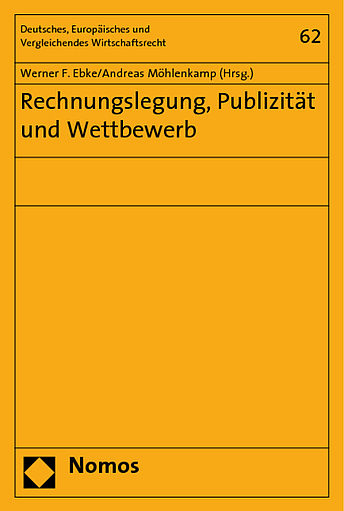englischFinancial accounting and financial disclosure play an increasingly important role for companies, especially in view of the present crisis of the global financial markets. Today, financial statements are disclosed electronically and, consequently, open to the public, both domestically and internationally. Investors, creditors, competitors and employees as well as other socalled stakeholders now have access to the financial information of a company, both in quantitative and qualitative terms. What impact do financial accounting and disclosure have on markets and competitors? How much financial disclosure is really needed? Are the present European rules on financial accounting and disclosure still sound if compared to the rules of other global players (e.g., the USA, Japan, China and India)? What changes are required to ensure both the necessary transparency and the protection of legitimate individual interests. These and other questions are the focus of the contributions to the present book. The authors address the relevant issues from a German, European, U.S. American and comparative perspective. Recent decisions of the European Court of Justice and the European Court of First Instance as well as a seminal decision of the District Court of Osnabrück, Germany, gave rise to the present debate. The authors contribute to this debate with a particular emphasis on non-listed small and medium-sized companies whose special interests and particular needs are all too often overlooked in the present debate.
Für den Erfolg eines Unternehmens und die Bewältigung etwaiger Krisen spielt eine gute Kommunikation mittels Rechnungslegung und Publizität eine zunehmend wichtigere Rolle. Jahresabschlüsse von Unternehmen sind heute elektronisch zu veröffentlichen und daher weltweit zugänglich. Nicht nur Anleger und Gläubiger, sondern auch Wettbewerber, Arbeitnehmer und andere so genannte Stakeholders erhalten damit Einblicke in die Vermögens-, Finanz- und Ertragslage der publizitätspflichtigen Unternehmen. Wie wirken sich Rechnungslegung und Publizität auf den Wettbewerb aus? Wie viel Transparenz brauchen die Märkte? Sind die europäischen Vorgaben für die Rechnungslegung und Publizität von Wirtschaftsunternehmen angesichts der oft weniger weit reichenden Regelungen anderer wichtiger Wirtschaftsnationen (z.B. USA, Japan, China, Indien) noch zeitgemäß? Welche Maßnahmen sind zum Schutz berechtigter Geheimhaltungsbedürfnisse erforderlich?
Diesen und anderen Fragen gehen die Autoren dieses Bandes in ihren Beiträgen zum deutschen und ausländischen Recht nach. Hintergrund für die wachsende Bedeutung des Themas „Publizität und Wettbewerb“ bilden jüngere Entscheidungen des Europäischen Gerichtshofs und des Europäischen Gerichts erster Instanz sowie ein viel beachteter Beschluss des LG Osnabrück.
Die Herausgeber und Autoren dieses Bandes wollen einen Beitrag leisten zu der Debatte um das Thema „Publizität und Wettbewerb“ in einer sich auch in Zukunft weiter vernetzenden Welt. Der international tätige, aber börsenunabhängige Mittelstand bildet den Schwerpunkt der Abhandlungen, weil diese Unternehmen in der Vergangenheit in der Publizitätsdebatte oft vernachlässigt wurden.


